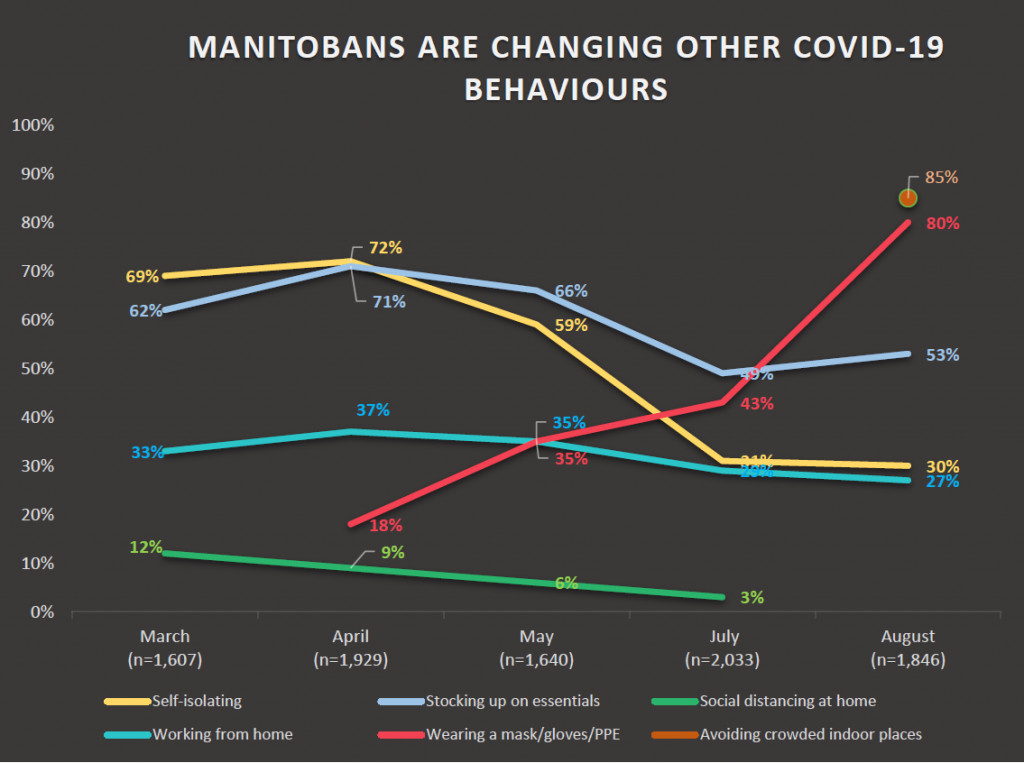Research |

Perceptions and perspectives from Manitobans about pandemic behaviours (September 15, 2020)
September 15, 2020![]() Click here for a print friendly version of this report
Click here for a print friendly version of this report
Manitobans are maintaining some pandemic behaviours.
In March 2020, Manitobans quickly adopted recommended behaviours to reduce the spread of COVID-19. Over time, Manitobans have continued to use many of these measures to reduce the spread. In August 2020, over 90% of Manitobans continue to wash their hands often, avoid handshakes, and practice social distancing. The proportion of Manitobans doing these things has remained relatively unchanged over five surveys.

Manitobans are changing other behaviours.
While the proportion of those who report stocking up on essentials has fallen (from 71% in April), about half of Manitobans (53%) reported stocking up in August. This could be to reduce shopping trips (and thus exposure to crowds) or a belief that with the coming second wave, another lockdown may occur.
About 3 in 10 Manitobans (30%) continue to self-isolate (down from 72% in April), and over 1 in 4 (27%) continue to work from home.
The wearing of masks (and other personal protective equipment [PPE]) has increased significantly from 18% in April to 80% in August. Almost as many Manitobans (85%) report that they are avoiding crowded indoor places.

Self-reported behaviour may differ in both consistency and intensity. For example, respondents indicating that they wear a mask or other PPE when outside their homes would include those who wear a mask as soon as they leave, as well as those who only put on masks once they enter a crowded store. Similarly, avoiding crowded indoor places may include very different behaviours depending on a respondent’s definition of “crowded.”
These results demonstrate Manitobans’ continued recognition of the importance of certain behaviours to reduce the spread of COVID-19.
Regardless of demographics, most Manitobans practice these behaviours in similar proportions.
A similar proportion of Manitobans appear to be practicing most of these behaviours regardless of gender, age, or location. There are, however, some exceptions.
The oldest age cohort (65 and older) is most likely to report self-isolating (43%) and indeed, those reporting that they are self-isolating steadily declines as respondents get younger (e.g., 20% of those 18 to 29 years of age report they are self-isolating).
Winnipeggers (84%) are slightly more likely than those living outside the city (73%) to report wearing a mask (or other PPE). Women (82%) are also slightly more likely than men (76%) to report wearing masks (or other PPE) when out of their homes.
METHODOLOGY
PRA conducted the survey from August 27 – September 1, 2020, using its Manitoba Panel. In total, 1,846 Manitobans completed the survey.
Because this sample is a non-probability sample, no error rate can be calculated. A random population survey of this size would yield an error rate of ± 2.3% (19 times out of 20).
As any sample may not represent the population perfectly, PRA corrects statistically for discrepancies in gender, age, and income to ensure that the sample corresponds as closely as possible to Statistics Canada information.
PRA Inc. sponsored these questions independently.
No other organization, public or private, funded this study in whole or in part.
For more information about the research, please contact Nicholas Borodenko, partner, at borodenko@pra.ca
(204) 987-2030 or toll-free at 1-888-877-6744
Recent Posts

Manitobans Express Growing Concern Over Potential US Tariffs and Adjust Habits to Support Local Economy
February 12, 2025Authored by Zia HameedQuestions about the research can be directed to Nicholas Borodenko, borodenko@pra.ca Recently, the United States proposed to impose tariffs on Canada, initially set to be implemented on February 4, 2025. However, a temporary 30-day pause has been agreed upon. A recent survey conducted by PRA Inc. has revealed that Manitobans […]

Non-seatbelt use higher in rural Manitoba, while electronic communication device use higher in Winnipeg: Manitoba Public Insurance
A road safety observation study commissioned last fall by Manitoba Public Insurance reports that non-seatbelt use is higher in rural Manitoba with 10 per cent of all drivers observed not wearing their seatbelt, compared to three per cent in the Winnipeg capital region.
